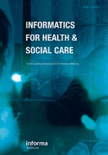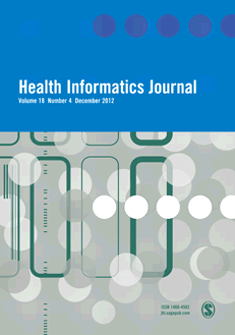
JOURNAL OF MEDICAL INTERNET RESEARCH
Scope & Guideline
Shaping the Future of Digital Health Practices
Introduction
Aims and Scopes
- Digital Health Interventions:
The journal extensively covers studies related to the design, implementation, and effectiveness of digital health interventions aimed at improving various health outcomes, including mental health, chronic disease management, and patient education. - Telemedicine and Remote Care:
Research on telemedicine practices, especially during and post-COVID-19, is a significant focus, exploring how remote consultations can enhance healthcare delivery and patient engagement. - Artificial Intelligence in Healthcare:
The incorporation of AI technologies in clinical decision-making, diagnostics, and patient management is a prominent area, with studies examining both the potential benefits and challenges of these technologies. - Health Informatics and Data Analytics:
JMIR emphasizes the importance of data-driven approaches in healthcare, including the use of electronic health records, big data analytics, and machine learning to inform clinical practices and public health strategies. - Patient Engagement and Empowerment:
The journal highlights research on methods to enhance patient engagement through digital tools, focusing on self-management, health literacy, and the use of mobile applications to support health behaviors. - Ethical and Regulatory Considerations:
The journal discusses ethical implications and regulatory frameworks surrounding the use of digital health technologies, particularly regarding data privacy, security, and equity in access to care.
Trending and Emerging
- Artificial Intelligence and Machine Learning:
There is a significant increase in research focused on the application of AI and machine learning in healthcare settings, encompassing predictive analytics, diagnostic tools, and personalized treatment plans. - Digital Mental Health Tools:
The use of digital mental health interventions, including apps for anxiety, depression, and stress management, is rapidly expanding, reflecting the growing recognition of mental health issues exacerbated by the COVID-19 pandemic. - Patient-Centered Care Models:
Emerging research emphasizes patient-centered approaches that leverage digital tools to enhance patient engagement, self-management, and shared decision-making in healthcare. - Behavioral Health and Lifestyle Interventions:
Studies focusing on the integration of behavioral health interventions with lifestyle modifications through digital platforms are gaining momentum, particularly in addressing chronic conditions. - Health Equity and Digital Divide:
There is a rising concern about health disparities and the digital divide, leading to increased research on strategies to ensure equitable access to digital health technologies for underserved populations.
Declining or Waning
- Traditional Health Education Models:
There is a noticeable decline in studies centered around conventional health education models, as the focus shifts towards more interactive and technology-enhanced educational approaches. - Single-Platform Digital Health Solutions:
Research on single-platform solutions is waning as there is a growing emphasis on integrated, multi-modal approaches that leverage various technologies and platforms for comprehensive health management. - General Telehealth Adoption Studies:
While telehealth remains important, there is a decreasing frequency of general studies on telehealth adoption, with a shift towards specific applications and outcomes related to telehealth interventions. - Focus on Basic Technology Assessments:
Research that primarily evaluates the functionality of basic technological tools without considering user experience and engagement is becoming less common, as more comprehensive evaluations are prioritized. - Generic Mental Health Interventions:
Studies focusing solely on generic mental health interventions are declining in favor of more tailored, personalized approaches that consider the unique needs of diverse populations.
Similar Journals

BMJ Health & Care Informatics
Advancing Knowledge at the Intersection of Health and DataBMJ Health & Care Informatics, published by the esteemed BMJ Publishing Group, stands at the forefront of the rapidly evolving field of health informatics. Established as an Open Access journal in 2019, it is dedicated to disseminating high-quality research that enhances the integration of health care with information technologies. With a prominent Q1 ranking in 2023 across categories such as Computer Science Applications, Health Informatics, and Health Information Management, this journal serves as an essential resource for researchers and practitioners alike. The journal is indexed in reputable databases and boasts impressive Scopus ranks—notably, it is placed #43 among Health Informatics journals. The aim is to foster innovation and understanding in health care practices through rigorous research and collaboration. Encompassing a wide spectrum of topics within health data science, usability, and outcomes research, BMJ Health & Care Informatics is pivotal for anyone involved in advancing health care through technology.

npj Digital Medicine
Shaping the Future of Medicine with Open Access Knowledgenpj Digital Medicine is a leading journal in the interdisciplinary landscape of digital health, published by NATURE PORTFOLIO. Since its inception in 2018, this open-access journal has rapidly established itself as a premier platform for innovative research and insights at the intersection of technology and healthcare. With an impressive impact factor and ranked in the Q1 category across multiple fields—including Computer Science Applications, Health Informatics, and Medicine—npj Digital Medicine represents the forefront of research aimed at revolutionizing patient care and healthcare delivery through digital advancements. The journal is positioned in the top percentiles of Scopus rankings, highlighting its vital role in shaping the future of medicine in an increasingly digital world. By providing a space for rigorous research and practical applications, npj Digital Medicine invites contributions from researchers, clinicians, and technologists eager to explore novel solutions to contemporary health challenges, ultimately enhancing patient outcomes on a global scale.

Interactive Journal of Medical Research
Empowering researchers with open access to innovation.The Interactive Journal of Medical Research (ISSN: 1929-073X; E-ISSN: 1929-073X) is an esteemed publication by JMIR Publications, Inc., renowned for its commitment to advancing the field of medical research through innovative and accessible scholarship. As an Open Access journal since 2012, it provides researchers, clinicians, and students around the globe with the opportunity to access cutting-edge studies without any subscription barriers, thereby promoting the rapid dissemination of knowledge in the rapidly evolving landscape of health and medical informatics. The journal's scope encompasses a diverse range of topics, including health data analytics, digital health innovations, and user-centered design in medical software, making it an essential resource for those seeking to stay at the forefront of medical research. With a dedicated readership and a focus on real-world applications, this journal plays a pivotal role in fostering collaboration among professionals and nurturing the next generation of researchers in the medical field. For further details, visit JMIR Publications' website and explore the wealth of resources available.

Informatics for Health & Social Care
Advancing patient outcomes via health informatics.Informatics for Health & Social Care is a leading journal published by Taylor & Francis Inc, dedicated to the intersection of health informatics and social care. With a strong emphasis on advancing knowledge in the fields of health information management and nursing, this journal has established itself as a vital resource for researchers and professionals seeking to explore innovative applications of informatics to improve patient outcomes and streamline healthcare delivery. Recognized for its influential contributions, it currently holds a Q2 ranking in both Health Informatics and Health Information Management, as well as a prestigious Q1 ranking in Nursing (miscellaneous) for 2023, signifying its critical role within the academic community. The journal is accessible for open access viewing, fostering a broader dissemination of research findings. Released continuously since 1976, it stands as a testament to the evolving landscape of health informatics, addressing pertinent issues and facilitating discussions that shape practices in health and social care delivery.

Lancet Digital Health
Transforming Health Systems with Cutting-Edge Research.Lancet Digital Health is an esteemed Open Access journal published by ELSEVIER, dedicated to advancing the interdisciplinary field of digital health. Since its inception in 2019, the journal has rapidly established itself as a leading platform for disseminating high-quality research focusing on the implications of digital technology in healthcare delivery, health informatics, and patient management. Renowned for its rigorous peer-review process and commitment to academic excellence, Lancet Digital Health currently holds prestigious Q1 rankings across multiple categories including Decision Sciences, Health Informatics, and Medicine (miscellaneous) as of 2023. With an impressive impact in its field—ranked #1 in Health Informatics and within the top percentile of related disciplines—this journal offers vital insights into the ongoing transformations within health systems globally. Researchers, healthcare professionals, and students alike will find a wealth of cutting-edge studies, practical applications, and discussions on the future of digital health, fostering an evidence-based dialogue that is essential in today's rapidly evolving medical landscape.

International Journal of E-Health and Medical Communications
Exploring the synergy of health informatics and communication.Welcome to the International Journal of E-Health and Medical Communications, a pivotal publication designed to bridge the gap between health informatics and computer science applications. Published by IGI Global, this journal serves as a platform for innovative research and insights into e-health technologies, health communication strategies, and the evolving role of digital tools in enhancing healthcare delivery and management. With an ISSN of 1947-315X and E-ISSN 1947-3168, it caters to an audience keen on advancing the intersection of technology and health, as evidenced by its respectable standings in Scopus rankings—positioned in the 64th percentile in Health Informatics and 63rd in Computer Science Applications. Over its publication history from 2010 to 2024, the journal has consistently contributed to significant discussions and advancements within these fields, highlighted by its Q3 quartile ranking in 2023. Join a community of researchers, professionals, and students dedicated to the ongoing exploration of e-health, as we collectively navigate the complex landscape of healthcare innovation.

Health Informatics Journal
Unlocking insights at the intersection of health and technology.Health Informatics Journal, published by SAGE Publications Inc., serves as a premier platform for research and discussion in the dynamic field of health informatics since its inception in 1995. With an impressive Q2 ranking in the Health Informatics category and a notable 77th percentile ranking in the Scopus database, this journal provides an essential resource for academics and professionals alike. The journal's transition to Open Access since 2020 has further broadened its reach, ensuring that innovative research is accessible to a global audience. Covering a wide range of topics within health informatics, the journal aims to foster high-quality scholarly communication and facilitate the dissemination of cutting-edge insights that can help advance health care delivery and patient outcomes. With an ongoing commitment to excellence, the Health Informatics Journal is dedicated to enhancing the intersection of technology and healthcare through rigorous research and collaborative exploration.

JMIR mHealth and uHealth
Pioneering Research in mHealth and uHealthJMIR mHealth and uHealth is a leading peer-reviewed journal that focuses on the innovative aspects of mobile health (mHealth) and the utilization of technology in health care, published by JMIR Publications, Inc. Since its inception in 2013, this Open Access journal has rapidly established itself as a vital resource in the realm of health informatics, currently ranked #13 out of 138 in the Scopus category of Medicine - Health Informatics, placing it in the top 10th percentile. With a Q1 ranking in Health Informatics for 2023, it is recognized for its high-quality research contributions and significant impact in shaping the future of health technology. The journal serves as an essential platform for researchers, professionals, and students seeking to advance their understanding of how mobile solutions can enhance health outcomes and patient engagement. Accessible to a global audience, JMIR mHealth and uHealth aims to foster collaboration and innovation in the fields of mHealth and uHealth, encouraging the dissemination of research that transforms health care practices.

JAMIA Open
Advancing health informatics through open collaboration.JAMIA Open is an open-access journal dedicated to advancing the field of health informatics, published by Oxford University Press. Since its inception in 2018, the journal has provided a platform for novel research, reviews, and case studies that bridge the gap between healthcare and information technology. With an impressive impact factor and a current classification in the Q2 quartile for Health Informatics, JAMIA Open has established itself as a vital resource for researchers and practitioners alike, facilitating the dissemination of innovative findings that contribute to the evolution of healthcare systems. Based in the United States, the journal is committed to providing free and equitable access to high-quality research, thus promoting a collaborative and informed approach to tackling pressing health issues. As it continues to grow and evolve, JAMIA Open remains a cornerstone in the landscape of health informatics, appealing to a diverse audience of researchers, professionals, and students looking to inspire change in their fields.

Healthcare Technology Letters
Transforming healthcare with cutting-edge technology solutions.Healthcare Technology Letters is a leading open-access journal published by WILEY that has been at the forefront of disseminating cutting-edge research in the field of health informatics and health information management since its inception in 2014. With an E-ISSN of 2053-3713, this esteemed journal is recognized for its commitment to advancing knowledge and practice in healthcare technology, making it a vital resource for researchers, professionals, and students alike. The journal's scope encompasses a wide range of topics, including digital health solutions, data management, and innovative technologies that enhance patient care. It holds a respectable position in the academic community, featuring a Q3 ranking in both health informatics and health information management as of 2023, and consistently contributing to high-impact research evidenced by its Scopus rankings. By providing open access to its content since 2017, Healthcare Technology Letters ensures that valuable insights and breakthroughs can reach a broader audience, furthering the impact of its published work on the global health landscape.